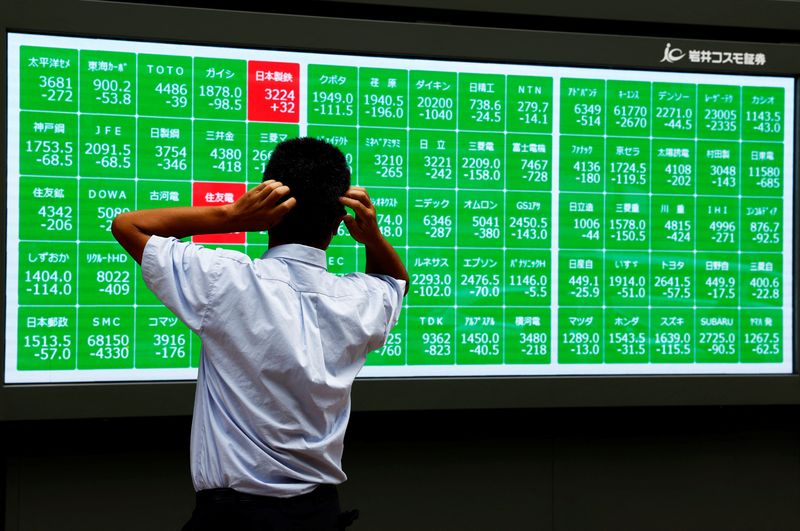By Wayne Cole
SYDNEY (Reuters) – Stock markets fell and bonds rose in Asia on Monday as fears the United States was heading for a recession sparked massive risk aversion and expectations that interest rates would have to fall quickly and sharply to support growth.
Investors started where they ended Friday, with Nasdaq futures down 1.87%, while S&P 500 futures fell 1.22%.
MSCI's broadest index of Asia-Pacific shares outside Japan fell 0.7%, while Japan's Nikkei fell another 5.5% to a seven-month low.
Japan's 10-year bond yield fell as much as 17 basis points to its lowest level since April at 0.785% as markets radically reassessed the possibility of another rate hike by the Bank of Japan.
There was demand for government bonds, with the yield on 10-year government bonds falling to 3.755%, the lowest level since mid-2023.
The two-year rate fell 50 basis points last week to 3.82% and could soon fall below the 10-year rate, turning the curve positive again, as has signaled recessions in the past.
The worryingly weak July payrolls report saw markets pricing in a nearly 70% chance that the Federal Reserve will not just cut rates in September, but by as much as 50 basis points. Futures imply 155 basis points of cuts this year, with a similar amount in 2025.
“We have raised the probability of a 12-month recession by 10 percentage points to 25%,” Goldman Sachs analysts said in a note, but they believe the danger is limited by the Fed's ample scope for policy easing.
Goldman now expects rate cuts of a quarter of a percentage point in September, November and December.
“The premise of our forecast is that jobs growth will recover in August and that the FOMC will judge that 25 bp cuts are sufficient to address any downside risks,” they added. “If we are wrong and the August jobs report is as weak as the July report, then a 50 bp cut in September is likely.”
Analysts at JPMorgan were even more pessimistic, estimating the chance of a recession in the US at 50%.
“With the Fed looking significantly behind the curve, we expect a 50 basis point rate cut at the September meeting, followed by another 50 basis points in November,” said economist Michael Feroli.
“There could indeed be an argument for some easing between meetings, especially if the data eases further — though Fed officials may be concerned about how such a move could be (mis)interpreted.”
IN SEARCH OF SAFE HARBOURS
Investors will get a taste of service sector employment in the ISM non-manufacturing survey, due later Monday. Analysts are hoping for a rebound to 51.0 after an unexpected fall to 48.8 in June.
Earnings this week come from industrial leader Caterpillar and media giant Walt Disney, providing more insight into the state of consumers and manufacturing. Also reporting are health care heavyweights such as weight-loss drug maker Eli Lilly.
The huge drop in Treasury yields also overshadowed the US dollar's usual safe-haven appeal, sending the currency down about 1% on Friday.
On Monday morning, the dollar fell another 0.6% against the Japanese yen to 145.53, while the euro held steady at $1.0920.
The Swiss franc benefited most from the decline in risks, with the dollar hitting a six-month low of 0.8571 francs.
“The shift in expected interest rate differentials versus the US outweighs the deterioration in risk sentiment,” said Jonas Goltermann, deputy chief economist at Capital Economics.
“If the recession story really takes hold, we expect this to change and the dollar to recover as safe-haven demand becomes the main driver in currency markets.”
Investors had also bet that other major central banks would follow the Fed's lead and ease even more aggressively. The European Central Bank is expected to cut by 67 basis points by Christmas.
On commodity markets, gold prices fell to $2,421 an ounce, possibly undermined by investors using profits to cover losses elsewhere. [GOL/]
Oil prices rose on concerns about a growing conflict in the Middle East. However, demand worries caused oil prices to fall to an eight-month low last week. [O/R]
Brent rose 27 cents to $77.08 a barrel, while U.S. crude rose 23 cents to $73.75 a barrel.
(Reporting by Wayne Cole; Editing by Stephen Coates)

